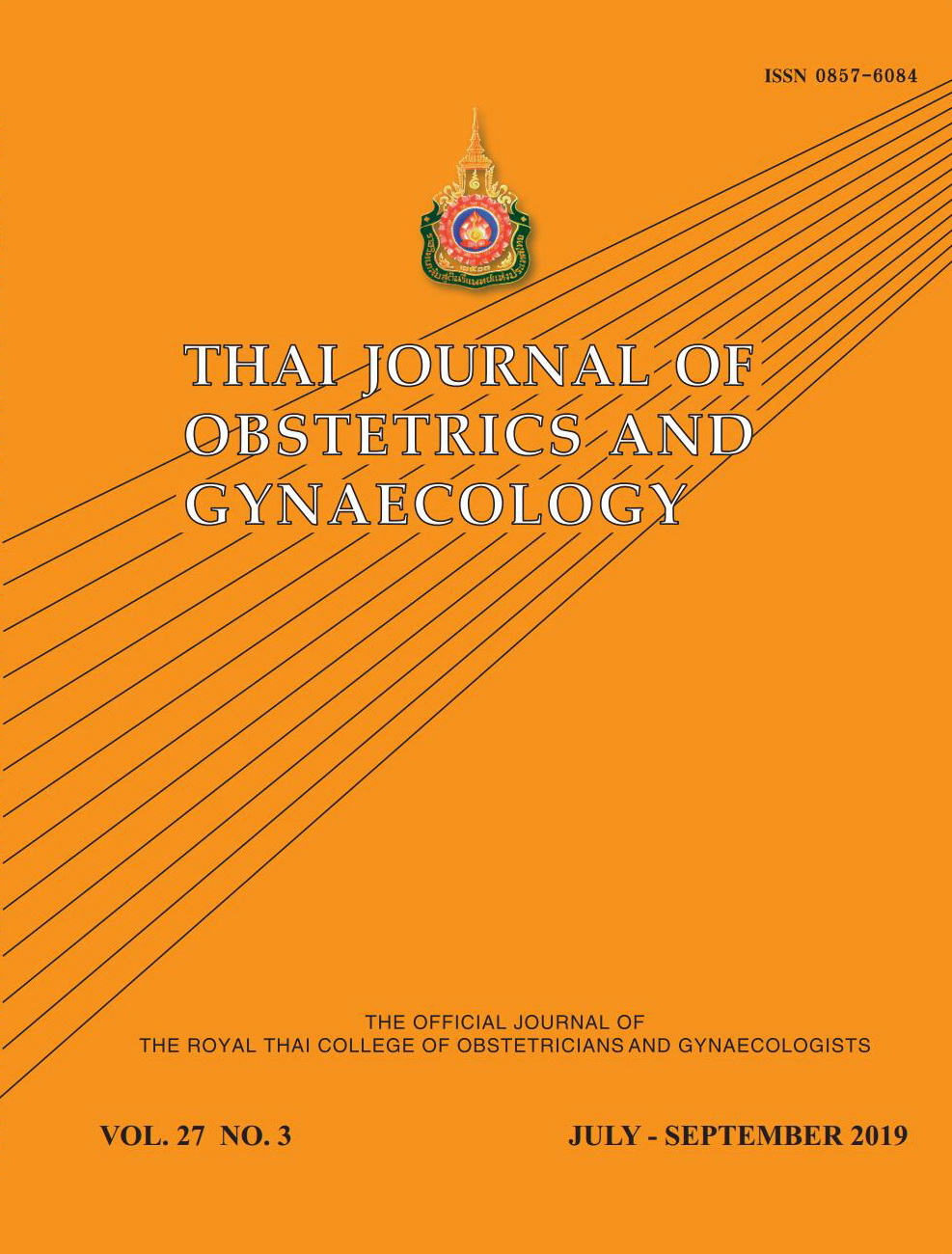Knowledge and Attitude of Pregnant Women Undergoing Cell-free DNA Screening at the King Chulalongkorn Memorial Hospital
Main Article Content
Abstract
Objectives: To investigate the knowledge and attitude of pregnant women before undergoing cell-free DNA screening at King Chulalongkorn Memorial Hospital (KCMH).
Materials and Methods: A cross-sectional study recruited 400 singleton pregnant women who underwent cell-free DNA screening at KCMH from December 2016 to August 2017. Self-administered questionnaires were used to evaluate participants’ knowledge and attitude.
Results: Four-hundred pregnant women answered the questionnaires and 344 responses were considered valid. The maternal age ranged from 23 to 46 years and mean age was 34.8 ± 3.6 years. Almost all of the participants answered correctly about the test’s ability to detect trisomy 21, trisomy 18, trisomy 13, and fetal sex (96.8, 83.7, 84.8, and 93.9% respectively). Eighty-nine percent of the women answered correctly about the time to start cell-free DNA testing, and 68% answered correctly about detection rate of trisomy 21. Some participants had misconceptions about the test’s ability such as false negative rate, thalassemia screening, fetal malignancy detection, autistic detection, cleft lip-cleft palate detection, and the option of termination of pregnancy if the screening was positive. Seventy-nine percent were aware of the possibility of re-sampling. Additional data showed that participants had positive attitude towards cell-free DNA screening, and preferred to use it again for future pregnancy.
Conclusion: Our study showed that the majority of the participants had good knowledge of the test’s ability to detect trisomy, and a possibility of re-sampling. However, almost half of the participants misunderstood that it could detect all genetic abnormalities. This study showed the magnitude of expectations and misunderstandings about cell-free DNA screening.
Article Details
References
2. Pariente G, Hasan L, Gadot Y, De Souza LR, Lebovic G, Berger H. Canadian women’s attitudes toward noninvasive prenatal testing of fetal DNA in maternal plasma . J Matern Fetal Neonatal Med 2016;29:4008-14.
3. Centers for Disease Control and Prevention. Birth defects [Internet]. 2017 [cited 2016 Dec 19]. Available from:https://www.cdc.gov/ncbddd/birthdefects/downsyndrome/data.html.
4. Pangkanon S, Sawasdivorn S, Kuptanon C, Chotigeat U, Vandepitte W. Establishing of national birth defects registry in Thailand. J Med Assoc Thai 2014;97 Suppl 6:S182-8.
5. Pattanapesat J, Tanmookayakul U, Teerawattananon Y. Cost-benefit analysis of prenatal screening and diagnosis for Down syndrome in Thailand. J Health Sci 2012;21:667-84.
6. Wapner RJ. Prenatal diagnosis of congenital disorders. In: Creasy RK, Resnik R, Iams JD, Lockwood CJ, Moore TR, Greene MF, editors. Creasy and Resnik’s maternal-fetal medicine. 7th ed. Philadelphia: Elsevier 2014;417-64.
7. Lo YM, Corbetta N, Chamberlain PF, Rai V, Sargent IL, Redman CW, et al. Presence of fetal DNA in maternal plasma and serum. Lancet 1997;350:485-7.
8. Benn P, Cuckle H, Pergament E. Non-invasive prenatal testing for aneuploidy: current status and future prospects. Ultrasound Obstet Gynecol 2013;42:15-33.
9. Benn P. Non-invasive prenatal testing using cell free DNA in maternal plasma: Recent developments and future prospects. J Clin Med 2014;3:537-65.
10. Gil MM, Accurti V, Santacruz B, Plana MN, Nicolaides KH. Analysis of cell-free DNA in maternal blood in screening for aneuploidies: updated meta-analysis. Ultrasound Obstet Gynecol 2017;50:302-14.
11. Taglauer ES, Wilkins-Haug L, Bianchi DW. Review: cell-free fetal DNA in the maternal circulation as an indication of placental health and disease. Placenta 2014;35 Suppl:S64-8.
12. Committee Opinion. No. 640: Cell-free DNA screening for fetal aneuploidy. Obstet Gynecol 2015;126:e31-7.
13. Kou KO, Poon CF, Tse WC, Mak SL, Leung KY. Knowledge and future preference of Chinese women in a major public hospital in Hong Kong after undergoing non-invasive prenatal testing for positive aneuploidy screening: a questionnaire survey. BMC Pregnancy Childbirth 2015;15:199.
14. Choi SSN, Cahn LW, WWK T. Pregnant Women’s attitudes to and knowledge of non-invasive prenatal testing in Down syndrome screening in Hong Kong. Hong Kong J Gynaecol Obstet Midwifery 2014;14:43-50.
15. Mikamo S, Nakatsuka M. Knowledge and Attitudes toward Non-invasive Prenatal Testing among Pregnant Japanese Women. Acta Med Okayama 2015;69:155-63.
16. Manotaya S, Xu H, Uerpairojkit B, Chen F, Charoenvidhya D, Liu H, et al. Clinical experience from Thailand: noninvasive prenatal testing as screening tests for trisomies 21, 18 and 13 in 4736 pregnancies. Prenat Diagn 2016;36:224-31.
17. Farrell R, Hawkins A, Barragan D, Hudgins L, Taylor J. Knowledge, understanding, and uptake of noninvasive prenatal testing among Latina women. Prenat Diagn 2015;35:748-53.
18. Sahlin E, Nordenskjold M, Gustavsson P, Wincent J, Georgsson S, Iwarsson E. Positive attitudes towards Non-Invasive Prenatal Testing (NIPT) in a Swedish cohort of 1,003 pregnant women. PLoS One 2016;11:e0156088.
19. Allyse M, Sayres LC, Goodspeed TA, Cho MK. Attitudes towards non-invasive prenatal testing for aneuploidy among US adults of reproductive age. J Perinatol 2014;34:429-34.
20. Verweij EJ, Oepkes D, de Boer MA. Changing attitudes towards termination of pregnancy for trisomy 21 with non-invasive prenatal trisomy testing: a population-based study in Dutch pregnant women. Prenat Diagn 2013;33:397-9.

